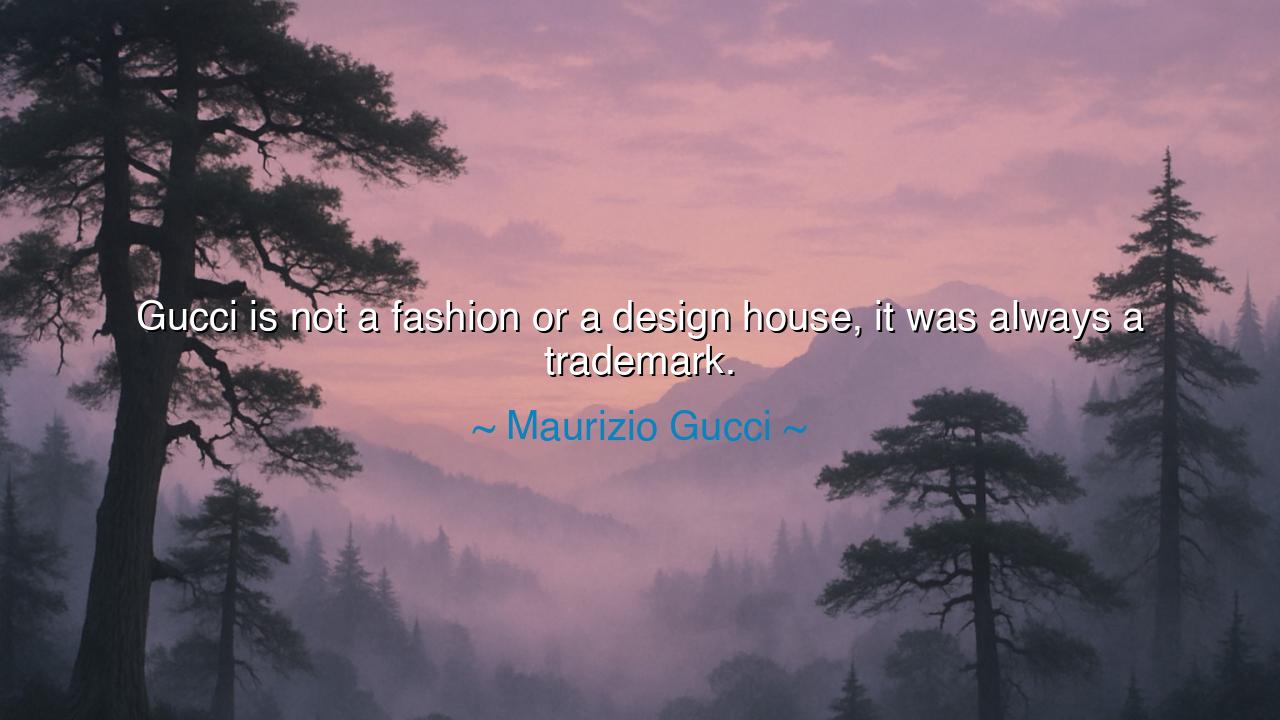
Gucci is not a fashion or a design house, it was always a






In the gilded yet turbulent world of luxury, Maurizio Gucci, heir to one of the most iconic names in fashion, once declared: “Gucci is not a fashion or a design house, it was always a trademark.” To the careless listener, these words may seem like mere business pragmatism—a statement about branding and commerce. But to those who listen deeply, they reveal a truth both philosophical and tragic, a reflection on identity, legacy, and the soul of creation. Maurizio’s words were born not from vanity, but from the struggle between artistry and ambition, between heritage and the hunger for immortality. He was not merely speaking of a company—he was speaking of how greatness is remembered, and what survives when artistry fades into empire.
To understand the origin of this quote, we must return to the house of Gucci, founded in Florence in 1921 by Guccio Gucci, a craftsman who began as a humble maker of fine leather goods. His designs spoke not only of elegance but of endurance; they carried the dignity of Italian workmanship and the quiet assurance of permanence. Over decades, the name “Gucci” ceased to belong solely to a man—it became a symbol, a mark of prestige, an emblem that promised not just style but power. By the time Maurizio inherited the empire in the 1980s, that name—once carved by artisans—had grown into a global machine of desire. Thus, when he said that Gucci was “always a trademark,” he was acknowledging what history had already made true: that the company’s identity had transcended art and become myth.
Maurizio Gucci was a man caught between worlds. He sought to restore his family’s legacy after years of scandal and discord, yet he also struggled against the very forces that made Gucci famous. To him, Gucci was not just a fashion house—a place of seasonal creativity—but a symbolic inheritance, an eternal mark that stood above fleeting trends. His statement was both proud and sorrowful, for it hinted at the paradox of all great names: that success can consume the spirit that birthed it. In seeking immortality through a trademark, the brand risks losing its humanity. Like the empires of old, whose banners outlived their founders, Gucci had become a standard, a name burned into time—unchanging, but also unfeeling.
History offers many such stories of creation that became monument. Consider the tale of Leonardo da Vinci. His art was not only mastery but revelation—yet the world remembers him not just for his paintings, but as a symbol of genius itself. His name became shorthand for excellence, just as Gucci’s did for luxury. But what Leonardo embodied in the soul, Maurizio watched turn into a marketable mark. The same transformation that turns vision into heritage also turns art into commodity. Maurizio’s insight, then, was not cynicism—it was truth. He saw that in the modern age, names live longer than ideas, and trademarks often outlast the dreams that created them.
And yet, within this truth lies a paradoxical beauty. For what is a trademark, if not a vessel that carries memory? The name “Gucci,” like a crest of an ancient family, bore the story of generations—the triumphs, betrayals, and genius of those who built it. When Maurizio spoke of Gucci as a trademark, he was not diminishing its artistry, but reminding the world that legacy itself must be guarded. The craftsman may perish, but the mark remains—a mirror of what once was. The tragedy, however, is that when a mark ceases to be animated by purpose, it becomes a hollow idol. A brand, no matter how revered, must still serve beauty, integrity, and imagination—or it withers into spectacle.
Maurizio Gucci’s life itself became a reflection of this warning. In his final years, he was consumed by power struggles within the company and the family name that once promised glory. His assassination in 1995 by those closest to him stands as a grim parable: that when legacy becomes possession, it breeds destruction. Yet his words endure, stripped of bitterness, shining with the wisdom of experience. He had glimpsed what many creators fail to see—that the true measure of a house, a business, or a life is not in how loudly its name is spoken, but in whether its soul still breathes within that name.
So let this be your teaching, O seeker of legacy: build not only a name, but a meaning. Whether you craft, lead, or dream, remember that what you make must serve something greater than itself. A name, a title, a brand—these are only vessels. What fills them—honor, empathy, truth—is what endures. If you wish your work to last, do not chase fame or permanence; instead, chase excellence, and let the mark you leave be born of sincerity. For as Maurizio Gucci knew, a trademark can live forever—but only the spirit that animates it gives it worth. In the end, it is not the name that sanctifies the deed, but the deed that sanctifies the name.






AAdministratorAdministrator
Welcome, honored guests. Please leave a comment, we will respond soon